Koji Tsuruoka is sipping green tea in Japan’s splendid embassy in Mayfair, recalling how his first two years as Japan’s ambassador to the UK have not gone quite according to plan. At least, they haven’t turned out how his predecessors assured him they would. One after another, ex-ambassadors advised him, before he took up the position on 6 June 2016, that he would find the UK very “stable”, and its politics “very predictable”.
The attractions of London’s ballet scene, opera and art galleries quickly lured him into thinking it would be “an excellent place to conclude my 40-plus years of diplomatic service in a very comfortable and quiet environment”. British politicians and civil servants he met early on were almost all sure the EU referendum would pass peacefully by. “Almost 99% said that you don’t have to worry because the British people don’t make adventurous decisions. They said it was irrational to leave because of the economic conditions… And you know what happened.”
A year later, after the Brexit bombshell caused global diplomatic and economic panic that reached Tokyo, Theresa May called a surprise general election that threw everything up in the air again. Thinking back to that period of turbulence, Tsuruoka stops for a few seconds and glances out of the window in the direction of Buckingham Palace. “Now I have to keep in mind that you don’t predict what is going to happen in the UK.”
That said, he does quickly predict, in his diplomatic and soft-spoken way, that Brexit will bring considerable economic uncertainty to this country, in the short term at least. He spells out how decades of ever-increasing Japanese investment into the UK have already come to a halt for the time being. He is well qualified to judge how Brexit will pan out. Before coming to London, Tsuruoka spent three intense years negotiating the Trans-Pacific Partnership, a trade deal that aims to reduce barriers between the US, Japan and 10 other Pacific nations. He knows as much as anyone about how international trade flows work, and about what is possible and what is not.
“We have 1,000 companies operating in the UK today funded by Japanese capital,” he says. “It accelerated after Margaret Thatcher promoted the UK as the ‘gateway to Europe’ for Japanese firms. The total Japanese investment to the EU’s 28 countries is of course huge, but out of 28 countries the UK alone now absorbs about 40% of total Japanese investment destined for the EU.”
This account of a relationship that strengthened year after year – in a period during which the UK was in the EU – raises a very obvious question. Will it continue to thrive after we have left? He replies decisively. “One thing I can say for certain, based on fact, is that the companies operating today in the UK are not expanding their investment in the UK today.”
Huge Japanese firms with big plants in the UK – such as Nissan and Toyota, who sell most of their British-made cars into the EU – are, he says, treading water, biding their time before deciding whether to relocate part or all of their businesses, so they can continue to be based inside the single market after March 2019. He tries not to sound alarming, but is clear about the threat to UK jobs. “They are currently considering and thinking and watching very closely what they need to do. That is why they are not investing additionally today.
“If you are proposing in your board meeting in a company that you need to invest more and build more cars in the UK today today there will be questions, and those are questions that are very difficult to answer today with certainty and therefore decisions are put off.”
For Japanese enterprises which came to the UK to sell into EU markets, tariff-free trade is the guiding star that decides where they locate.
“The reason that many of those companies have come is that this is the best gateway to Europe,” he says. “If that is in danger, if that is no longer sustainable, of course they will have to look at what they will have to do best. The existing arrangement for the single market is a total frictionless trade.”
He believes membership of the single market is as good as it gets for Japanese firms wanting to sell into the EU from European bases. “The EU is a very exceptional single market. I don’t think the single market could be substituted by something and be better or even be the same.”
It is not a uniform picture across the whole economy. There are sectors, such as software design, where the UK is still attractive, as it has the R&D expertise and skills. He cites the example of how Japan’s SoftBank agreed, after the referendum, to buy the British software design firm Arm Holdings for £24.3bn in the hope that it would become a global leader.
“That is one representation of what will go on and that was based on the assessment that the R&D, the hi-tech capability, the potential for the UK succeeding further in this area, was quite concrete… those technologies are not necessarily linked to the EU.”
Factory-based businesses, however – those producing goods for European markets rather than merely designing them – are a very “different issue”. They face real uncertainties if and when the terms of trade change. So too do Japanese financial institutions in the City, Japanese banks and other organisations offering financial services.
The fact they will no longer have passporting rights to operate into EU markets will have significant effects on employment here. “It is an issue – because having passporting rights to reach the single market and be part of the single market is a very efficient and cost-saving way of conducting financial services which is a regulated industry.” Will Japanese banks up sticks and go? No, he says, not lock, stock and barrel, because Europe is just part of their market. But jobs will head out of the City into the EU and Japanese companies will have to reduce their operations in London. “They are not leaving London, because London is a global financial centre, not just a centre for the EU – but they will have to relocate some of their EU business to the EU in order to continue serving the EU consumers.”
He is at pains not to talk down the UK’s post-Brexit prospects. Just as no one thought Brexit would happen when he arrived, no one can know for definite that it will turn out badly, as it approaches.
“If you take a longer term, five, 10, 20 years… things become more unpredictable,” he says. But he is clear that in the shorter term it will not be good for the UK economy nor the strength of its economic partnership with Japan.
He says Japan has not yet begun talks with the UK on a post-Brexit trade deal and that it would take several years to complete, if one is struck at all. It is another area of real uncertainty in the entirely unpredictable post-Brexit world that he never expected to encounter on arriving in London.

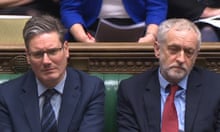


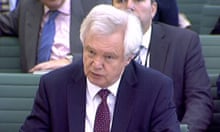
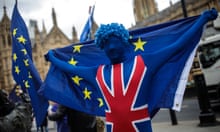


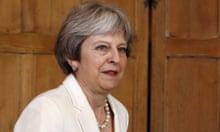
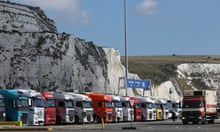
Comments (…)
Sign in or create your Guardian account to join the discussion